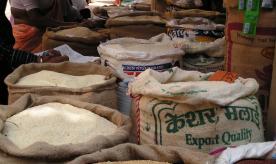In-kind transfers as insurance
In-kind transfers have historically been an important way in which countries transfer resources to poorer households – the World Bank estimates that 44% of individuals on social safety net programmes around the world receive in-kind transfers. In recent years, however, there has been increasing interest among academics and policymakers in moving toward unconditional cash transfers.
In this project, we consider one potential advantage of in-kind, relative to cash transfers: they can provide insurance against commodity price risk. In theory, the government could provide price indexed cash transfers, providing larger transfers to households in periods of high prices. In reality, this is likely to be difficult, since it requires the government to accurately measure local prices at a high level of frequency. In this context, in-kind transfers can provide partial insurance against risk: the effective value of the transfer rises automatically with local prices. Understanding the potential insurance value of in-kind transfers is therefore important for the broad debate regarding the appropriate design of social protection programs, inclusive of the specific debate around cash versus food transfers in India.
We begin by developing a model to consider the welfare effects of in-kind and cash transfers in a world with price risk. Then, we provide a detailed empirical examination of household exposure to price risk in India, using data from the National Sample Survey (NSS). Finally, we aim to examine the effects of the Public Distribution System (PDS) empirically, utilising administrative data on PDS policy changes.





